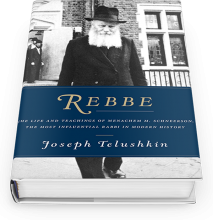Rebbe

In 2009, Sue Fishkoff released a book entitled, The Rebbe’s Army. This insightful work introduced us to the world of Lubavitch Chabad and the powerful influence it has had on the world through its shluchim, or “sent ones.” This work has aided both Jews and non-Jews in inspiring their organizations toward purpose and success. Now, on the twentieth anniversary of the passing of Menachem Mendel Schneerson, the seventh Lubavitcher leader, Joseph Telushkin has brought us an exhaustive biography (over six hundred pages) on this remarkable Jewish leader simply known as “Rebbe.” Like The Rebbe’s Army, it is a book that is an incredible inspiration. Unlike the previous work, however, Rebbe challenges the reader by way of one’s personal spirituality.
The book begins with the Rebbe’s life in his college years and gives us a few insights into his life in Europe. It then leads up to his unanimous appointment as the leader of Chabad, chronicling his forty something years of leadership by which he expanded both the vision and the numbers of the Lubavitch movement. It concludes with accounts near the end of his physical life and a look at how his leadership is still affecting people around the world. The final chapter devotes several pages which highlight major events in the life of the Rebbe year by year. Through this biography, one can not only learn a considerable amount the Rebbe, but what it means to be a mensch (a person of integrity or respect).
Telushkin informs us about the Rebbe’s wisdom, his brilliance, his incredible memory, his enormous vision, his laser beam focus, his uncanny insight, his discernment, his compassion, his humility, and his tireless persistence. He understood diplomacy, military strategy, psychology, financial investments and minute details to complicated issues. The Rebbe understood multiple languages and had read many sources in their original language, including philosophical works such as the works of Plato (and had evidently read them in their original language). Telushkin gives chapter after chapter of insights into the life of the Rebbe pulled from documented sources such as written correspondence and teaches of the Rebbe on video, to dozens of interviews of people who personally knew the Rebbe, to personal recollections as well (his father was the accountant for Chabad for a number of years).
One of the great takeaways from this book is hearing how the Rebbe was able to experience extreme (and often heated) disagreement with others while not turning his disagreement a personal attack. Though he may have had strong disagreements with others and may have even denounced their actions publicly (while keeping the person anonymous), he was nonetheless able to maintain close, sometimes affectionate relationships, with those whom he disagreed.
The Rebbe was a rare person, in that he was a man who lived completely for others and not for himself. The Rebbe is particularly known for his philosophy of ahavat Israel, love for one’s fellow Jew. He wholeheartedly believed the kabbalistic teaching that “the three loves—love of God, love of Torah, and love of one’s fellow—are one.” Teluskin describes how this belief shaped the Rebbe’s philosophy in regard to his actions and teachings as follows:
If a Jew loves God but lacks love for his fellow Jews, that in itself indicates that there is something lacking in his love of God. On the other hand, if a Jew loves people, is concerned with “providing bread for the hungry and water for the thirsty,” that person can be brought to love God and Torah as well. (p.35)
The Rebbe is quoted as saying, “For if the exile was brought about through unfounded hatred [b.Yoma 6b], we will bring the redemption through unbounded love” (p.79). Therefore, he believed it to be “the obligation of every Chasid, every Jew, to carry out God's mission on earth, and to do so with overflowing love. This is what would set the stage for God to redeem the world” (p.40).
One of his deeply rooted convictions was seen in his refusal to speak negatively (even in passing). This was a conviction deeply rooted in the teaching of his namesake, the third Lubavitcher rebbe, who was known to say, “Think good and it will be good.” Therefore, he thought good in all situations. He looked to God in every situation and refused to let negativism pass his lips.
Reading Rebbe was very emotional for me. It revealed the great chasm between my own personal life and that of this spiritual giant who seemed to be a “natural” in spiritual matters. On one hand it was discouraging, but on the other it was a source of great inspiration and an insight into practical applications of faith which encouraged me to go the extra mile to become a better leader in both my family and in the organizations which I serve.
Telushkin rightly observes that “A good leader creates followers. A great leader creates leaders. More than the Rebbe was a leader, he created leadership in others” (p.105). A few pages later he follows this by saying, “In addition to common sense and a sense of mission, the trait a leader most needs is a lack of fear. Many people of extraordinary capabilities are held back by fear of challenging others, fear of rejection, fear of being laughed at or of appearing to be naive or foolish” (p.108). The Rebbe indeed emanated leadership in a way that world has rarely seen, and this book is a reminder that the world needs more people who will become a little like the Rebbe and fearlessly lead others in humility towards the goal of tikkun olam, the repair of the world. May we all be inspired to fill the void around us with Torah and mitzvot, and may the memory of the Rebbe be for a blessing. This book is well worth the read, and would be a welcome addition to any serious collection.








